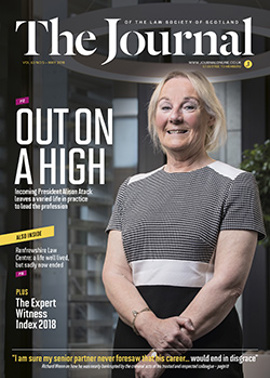New questions over statements

Much publicity heralded the expansion of rights of suspects and accused in police custody and new police investigative powers on 25 January 2018, with the introduction of measures in the Criminal Justice (Scotland) Act 2016. The Act also implemented a number of other recommendations from the Carloway review, and some have received far less attention.
Section 261ZA of the Criminal Procedure (Scotland) Act 1995 (inserted by s 109 of the 2016 Act; review, para 7.4.19) potentially carries significant implications for defence solicitors. It affects the admissibility of the accused’s statements made in the course of questioning by police officers or other investigating officials.
What is the change?
Before: The statements affected are those made by the accused and being against their interest, which form an important source of evidence in criminal trials. They fall into three categories:
- “I stole the goods”: statements indicating guilt;
- “I was not there as I was at the Ayr races”: statement that exonerates;
- “I had sex but it was consensual”: mixed statements being both incriminatory and exculpatory.
Hearsay evidence is inadmissible in court as it is treated as “secondhand” and not the best evidence. The incriminatory statement (1) was an exception to this rule and could be led as evidence. However, the mixed statement (3) could only be treated in this manner where the Crown led the mixed statement for its inculpatory value and the defence could rely on the exculpatory aspects as evidence of the facts. The defence could not so rely on the exculpatory material in a mixed statement if the Crown chose not to lead the statement. These exceptions were set out in Morrison v HM Advocate 1990 JC 299 and McCutcheon v HM Advocate 2002 SCCR 101.
The position of statements by the accused to the police and others differed evidentially from those made in court where the accused elected to give evidence. The accused’s evidence is given on oath (thus perjury charges can follow) and is subject to robust cross-examination (challenging reliability and credibility).
In short, the accused’s exculpatory account could only be given by evidence on oath at the trial.
Now: Lord Carloway considered that making a distinction between the types of statements was complex and difficult for any jury to understand, even when provided with directions. The overall purpose of the 2016 Act is to modernise the law. Now, where “statements made to the police or other officials in the course of an investigation are concerned, no distinction is drawn between them in terms of admissibility. All statements made by accused persons to such persons in that context should be admissible in evidence for all generally competent purposes, including proof of fact, in the case against that accused except where the content of a statement would otherwise be objectionable” (2016 Act Policy Memorandum, para 149).
It is the effect of such statements that has now changed. The question of whether to admit such statements, i.e. admissibility, remains unchanged. The circumstances in which such statements were made are still for the court to assess. The paramount test is fairness to the suspect. Challenges will arise, e.g. where the procedural rules in the 2016 Act are not observed, such as not offering access to a lawyer.
Police interviews, a major focus of the 2016 Act’s reforms, provide an early opportunity to the accused to state their position, though false statements can never be excluded. That does not prejudice the accused’s right to remain silent and adopt a “No comment” interview, with or without the benefit of legal advice.
What does this mean?
An accused can now use any statement given to a police officer or other official, such as DWP or HMRC officials, which can be given outside an interview as evidence of fact. The accused need not go on to give evidence in person in court and can rely on that statement. The judge or jury will assess the reliability and credibility of such statements. Examples illustrate this:
- J is a suspect for attempted murder. At interview, J says: “It was only a punch in self defence.” That statement once led is evidence of fact and is available to the jury.
- J may still decide to, but need not, amplify this by giving evidence.
- S says: “I was not shouting and swearing.” That statement is evidence of fact. S need not provide any more explanation by giving evidence.
Result of the reform
Reservations still apply to such statements evidentially as they are not given on oath or subject to cross-examination. But there may be an advantage to providing the accused’s position at that stage. These are challenges for solicitors to consider when discussing with and advising clients whether to respond to a police officer or official questioning. In light of this change, we would recommend that this question should be carefully considered in relation to any advice by telephone or in person to the accused relating to any interview.
In this issue
- Levelling the land: pro bono expenses orders
- PSLs – an evolving role
- Children's panel appeals and client expectations
- APS and asps
- Reading for pleasure
- Opinion: Sarah Prentice
- Book reviews
- Profile: Katie McKenna
- President's column
- Use DPA to cut rejections
- People on the move
- Succession planning: five key steps
- A broader view of practice
- The Death of a Law Centre
- Something rotten
- Taking the strain in difficult executries
- Gender pay: a common cause
- Law, an emotional process
- Brexit: the devolution factor
- The PI Court makes its mark
- The house the Grants built
- New questions over statements
- Gender pay gap reporting: how employers can action change
- Human rights may not plug the gap
- Deferred debt arrangements: a missed opportunity?
- Scottish Solicitors' Discipline Tribunal
- LBTT: beware the crackdown
- Beating the career block
- Public policy highlights
- OPG update: new bond arrangement
- Profile of the Profession runs again
- Q & A corner
- GDPR: help is at hand
- Risk management – that ubiquitous topic
- Ask Ash
- Time to take aim at targets
- AML: don't miss the 26 June deadline
- Expert Witness Index 2018
- The right diagnosis






